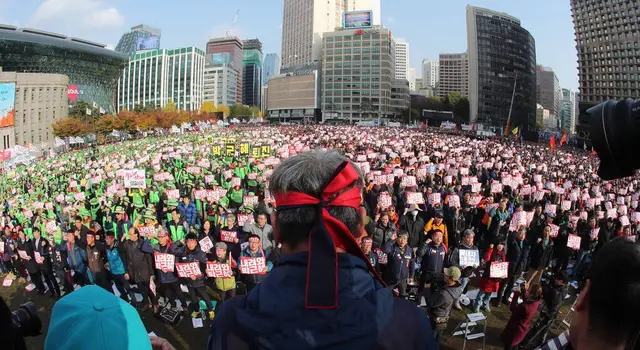At least seven out of 10 South Koreans demanded President Park Geun-hye, embroiled in a scandal involving her longtime confidante, resign or be impeached to take responsibility for the biggest political scandal since Park took office in February 2013.
According to a Realmeter survey released on Thursday, 73.9 percent of respondents demanded Park's resignation or impeachment. Such calls kept rising from 42.3 percent in late October to 60.4 percent the previous week.
A majority of them favored Park's voluntary resignation as impeachment takes months until it is ruled by the constitutional court. The impeachment motion, which can be put forward by the 300-seat National Assembly with over 200 votes in favor, can be dismissed by the highest court as seen in 2004.
Only 18.6 percent said the embattled president can finish her single, five-year term, but they called on Park to distance herself from domestic affairs and let a parliament-proposed prime minister form a coalition cabinet.
Public anger mounted as President Park delayed the date of being investigated by prosecutors though the first South Korean female leader accepted the probe in her second public apology earlier this month.
The prosecution office had initially claimed the need for face-to-face questioning over the scandal-plagued president no later than Wednesday, but Park's attorney requested its postponement by an undefined date citing the shortage of preparations.
Over a month has passed since allegations over the scandal emerged. Choi Soon-sil, the president's decades-long friend, has reportedly intervened in state affairs, including recommendations on diplomatic, defense and economic affairs, the appointment of government officials and the editing of presidential speeches.
Anger exploded after Park on Wednesday ordered a thorough investigation into a separate corruption scandal surrounding a tourism complex development project in the southern port city of Busan. People got enraged at the order by the president who has yet to accept a probe into herself.
Presidential spokesman Jung Youn-kuk said Park gave an order of mobilizing all possible investigative capabilities on suspicions that government officials and politicians of both ruling and opposition parties are involved in creating an exponential amount of slush funds.
The presidential Blue House has maintained that Park's resignation or her unconditional divorce from all state affairs violates the constitution that guarantees the five-year term except for treason and insurrection charges, indicating a strong will to finish her presidency till February 2018.
Anti-Park rallies and the political campaign to let the president step down seem not to come to an end in the foreseeable future as Park's office refused the resignation demand.
Last Saturday, over a million people took to the streets in Seoul, the biggest mass rally since about a million protested against the military dictatorship in June 1987. This Saturday's rally is forecast to draw a similar number of demonstrators.
Park's approval rating slid to the single digits. According to a weekly Realmeter survey, support for Park was 9.9 percent, down 1.6 percentage points compared with the previous week.
It was the first time that Realmeter's poll recorded Park's approval rates below 10 percent in about four years in her office. Another pollster Gallup Korea's survey showed her support rate at 5 percent, staying at the lowest for two weeks in a row.
Negative assessment on Park's governance increased 2.0 percentage points to 85.9 percent this week, the highest since she took office in early 2013.
Approval rating for Park's ruling Saenuri Party reached the record low under the Park administration at 18.2 percent this week, down 1.0 percentage point from a week ago. The downward trend continued for seven straight weeks.
The Minjoo Party, the country's biggest opposition party, posted a support rate of 30.5 percent, while the vote-wielding People's Party recorded its highest 17.0 percent in public support.
(BBC)
 简体中文
简体中文

